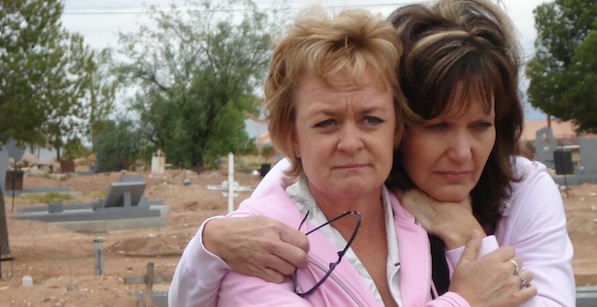Jennifer Steinman’s moving and inspiring documentary Motherland follows a 17-day trip to South Africa that transforms the lives of six grieving mothers from across the US. These women have little in common except that each have suffered the death of a child. Eight thousand miles from home, their South African journey offer little more than melancholy, as they are surrounded by children in desperate need. But they’ve come to serve others selflessly in the hope of reconnecting with their own humanity and will to live after their unspeakable loss. What these women come to share is a desire to make sense of their tragedies and to move forward with their lives.
When the film premiered at last year’s South By Southwest Film Festival, eFilmCritic’s David Cornelius sat down with Steinman to retrace her steps in leading these women on such a challenging emotional road.
Q: How did you discover these women, and what made you decide to document their journey?
A: The trip was actually something that I envisioned and organized myself after my good friend lost her son in a car accident (she is one of the moms on the trip). Initially I reached out to her grief counselor who helped me to locate several of the other women. Then, as the idea for the trip grew, I sent out a blast email– to grief groups, counseling centers, children’s hospitals, etc– describing the project and looking for more moms who might be interested in taking part in a “healing service trip.” I was absolutely overwhelmed by the response– I received almost 100 emails within 3 days! Women were sending me letters and pictures, telling me stories about the children they had lost and all wanting to be a part of the trip in honor of their kids. It was an incredibly emotional and moving couple of days and, needless to say, it was pretty hard to narrow it down to just six women. I knew I wanted a diverse mix of women, and in the end I had to really just trust my gut and pick the women I thought would fit together best and get the most from the trip.

Q: Each woman’s story begins with inconceivable loss. How emotional did things get during production?
A: There were definitely some very emotional days, and lots of raw emotion for everyone (myself and the crew included). For most of the women on the trip it had been less than two years since they’d lost their children so the pain was very fresh and on the surface at all times. As some one who doesn’t have children of my own yet, I was blown away by the strength and courage it takes for these amazing women to just get out of bed every morning and make the conscious choice to move forward. But I also think one of the most beautiful things about the trip, and about the human spirit in general, was the ability each person had to find laughter through the tears and huge amounts of joy even in the midst of inconceivable suffering. These moms truly are my idols.
Q: Your movie’s website mentions “our culture’s inadequacy for dealing with death and loss.” What would you say about grief in American culture that’s inadequate?
A: One of the things I kept hearing from all the American women in the film over and over again was the fact that they all feel completely isolated in their grief since their children have died. People ask them “how are you?,” but no one really wants to hear the real answer. We live in a culture where people just want the answer to be “I’m fine” and any other answer makes them feel uncomfortable. Eventually, the American women all said it was easier to shut down and stop talking to people, and many of them feel like outcasts among their communities. I think in Western culture death and grief have become taboo subjects to discuss– they are considered “bad” or “too hard” and people just don’t want to talk about them. But the reality is that grief is one of the most universal human emotions, and something that people experience every day, and losing someone you love is an inevitable reality that will touch us all at some point in our lifetimes. What we witnessed in South Africa, where death and grief are larger community issues, was that these subjects were not taboo at all and that people supported each other openly through the healing process, together as communities.
Read the full interview at eFilmCritic.




